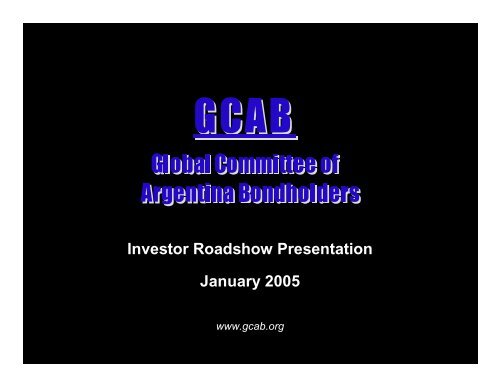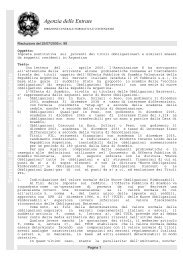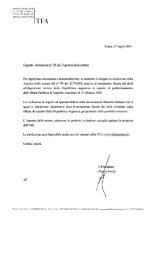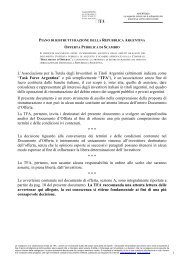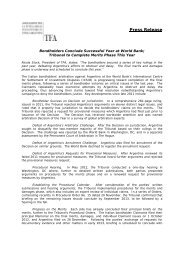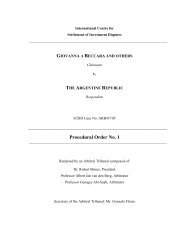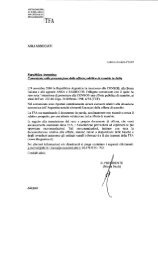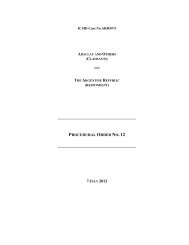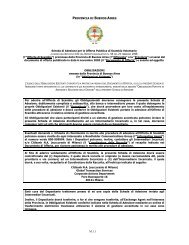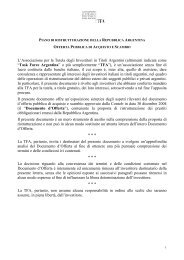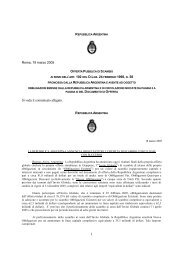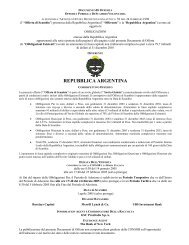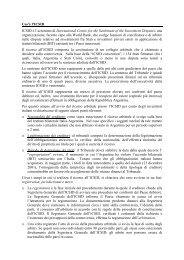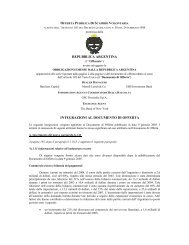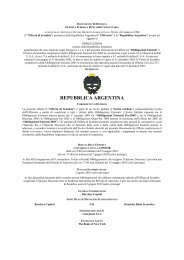Investor Roadshow Presentation January 2005
Investor Roadshow Presentation January 2005
Investor Roadshow Presentation January 2005
- No tags were found...
You also want an ePaper? Increase the reach of your titles
YUMPU automatically turns print PDFs into web optimized ePapers that Google loves.
PresentersDr. Nicola StockCo-Chair, GCABTask Force ArgentinaHans HumesCo-Chair, GCABArgentina Bondholders Committee
GCAB Represents the Major Bondholder GroupsWorldwideGCAB Steering CommitteeCo-Chair, Nicola Stock, TFACo-Chair, Hans Humes, ABCAdvisorsSub-Committees! Financial - Bear Stearns! Legal - White & Case! Financial / Economic! LegalArgentinaBondholdersCommittee (ABC)Task ForceArgentina (TFA)Bank of TokyoMitsubishiShinsei BankSwiss BankersAssociation(Observer Status)ABRA(Observer Status)! 90 institutionalmembers in the USand Europe! $10 billion inholdings! 420,000 retailmembers! Holders of primarilynon-US Dollardenominatedbonds, residing inItaly! $14.5 billion inholdings! BTM and Shinsei represent interests ofholders of Japanese Samurai bonds for $1.8billion! 40,000 retail members! Additional $1.2 billion in holdings of YenEurobonds (which do not share the samefiduciary commissioned bank provisions asthe Samurai bonds)! Representsinterests of Swissretail holders! $10 billion inholdings! More than 50,000retail investors! Representsinterests ofestimated 35,000retail investors inGermany, Austria,Switzerland andthe Netherlands.! $1.2 billion inholdingsGCAB General Membership Category - Added in July 2004! Institutional and retail investors globally! More than $1 billion in holdings3
What All Bondholders Should Know! Overwhelming consensus is that ARGENTINA CAN PAY MORE! HOLDOUTS WILL NOT SURRENDER THEIR RIGHTS and may ultimately gain asettlement worth at least the value of the current offer either through arevised offer, negotiations, or court action, which for certain issues couldinclude participation in class actions already underway or which may bestarted; court action may eventually lead to seizure of assets where available! If acceptance rate is significantly below precedents, Argentina will be underfinancial and political pressure to negotiate and improve the exchange offer! GCAB continues to champion creditors’ rights and claims. GCAB is leading theway for holdouts to pursue an outcome much more in line with historicalprecedents and Argentina’s ability to pay4
Argentina Can Afford To Pay More! Argentina’s foreign reserves have grown to approximately $20 billion, doublingsince the default! Argentina’s economy has rebounded strongly, with tax revenues reaching $36billion in 2004. Allocating 20% of those revenues to total annual debt service,an amount similar to other emerging economies, would make $7.2 billionavailable, compared to the $4.3 billion implied by Argentina’s exchange offer! Argentina’s primary budget surplus likely reached 5% of GDP in 2004.Maintenance of the current, higher fiscal effort would be in line with that ofsimilar indebted countries, and would represent significant value tobondholders! “Ability to Pay” must continue to be the guiding principle for debtrestructurings5
Argentina Can Afford to Pay MoreArgentina’s WillingnessArgentina’s AbilityCash Up Front $1.2 billion $6.0 billionAverage Annual Debt Serviceon New Debt, <strong>2005</strong>-2008 $1.3 billion $3.0 billionDate to Access Capital Markets No defined goal 2009Primary Surplus (% of GDP) 4.0%Target Participation Rate 50.0% >90.0%NPV as a % of principal 26.0% 55.2%6
Absence of Good Faith Negotiations! Argentina has not engaged in constructive dialogue with leading creditorgroups. The current proposal does not reflect any input from GCAB! Argentina has not provided sufficient disclosure; the most recent debtsustainability analysis on the Ministry of Finance’s website is dated 2003! Argentina has cut preferential side deals with domestic creditor groups and hasnot acted in a transparent mannerThere is widespread consensus that Argentina has not acted in good faithtowards creditors, despite its promises to the Official Sector7
Argentina’s Exchange Offer is InconsistentWith Precedents! No negotiations! No minimum acceptance level. Prior sovereign restructurings achievedgreater than 90%! No recognition of the majority of the $26 billion of interest payments (PastDue Interest, or PDI) missed since the default. Historically, PDI hasreceived superior treatment in negotiated sovereign restructurings! Historically low recovery value! No support from multilateral organizations. Multilaterals often provideletters of support and, in significant restructurings, financially participate inthe success of the offer by providing capital, resulting in a significantincrease in the Net Present Value of the offer8
The Official Sector Must Do More! Despite written commitment by Argentina to the IMF to engage in good faithnegotiations, the Republic has not done so! Due to Argentina’s lack of cooperation, the IMF has not succeeded as a neutralintermediary between Argentina and its creditors! Much of the Official Sector, other than that in Italy, has been noticeablyabsent in its objection to the coercive and unilateral methods Argentinahas undertaken! The IMF should renew the offer it made to Argentina in 2001 for a $3 billionline to facilitate a good faith debt restructuringGCAB calls upon the IMF and G-7 officials to follow Italy’s lead in publiclydenouncing Argentina’s unilateral approach to this restructuring9
Recent Comments from the Official SectorDomenico SiniscalcoMinister of Economy, Italy<strong>January</strong> <strong>2005</strong>Pierre Carlo PadoanExecutive Director, IMF<strong>January</strong> <strong>2005</strong>“If the (offer) is not accepted by enough creditors itwould open an unprecedented scenario with internationallawsuits and consequences difficult to foresee. TheArgentine government could be forced to draw up a newoffer.”“It should be clear that that if the creditors’ participationrate is lower than than 75%, it cannot be said that thedebt problem is resolved.... The Fund’s managementalways has asked Argentina to act in good faith, and itnever has.”J.F. HornbeckU.S. Congressional ReportOctober 2004“Argentina must settle with foreign bondholders if it is toreturn to the sovereign debt market.... the default is notonly unprecedented for its low recovery rate, but also forthe process that has stretched ... the guidelines ofsovereign debt negotiations.”10
Recent Comments from the Official SectorJean Pierre JouyetChairman, Paris ClubJuly 2004“We told [the Secretary of Finance] that it was undoubtedlynecessary for the proposal to be improved. It is importantthat a satisfactory solution for private creditors be foundbefore the public debt is negotiated.”IMF Internal DocumentJuly 2004“...The authorities seem to underestimate significantly theresources available for debt service.”11
The “Most Favored Creditor” Clause Does Not Protect Creditors! The exchange offer states: “Argentina reserves the right, in its absolutediscretion, to ... enter into a settlement in respect of any Eligible Securitiesthat are not exchanged.... The terms of any such purchases, exchanges,offers or settlements could differ from the terms of the Offer.”! The existence of this clause and the language it contains is a de factoadmission by Argentina that it wants to retain the flexibility to cut new dealsin the future! There is no guarantee that Argentina will give those that enter into the initialdeal the revised terms! In fact, Argentina has included a number of exceptions to this clause to protectthe country and allow it to lock out those who choose to accept the initialterms of the offerBased on Argentina’s track record, investors should discount this option12
Bondholders Who Accept Will Lose Significant Rights! Bondholders’ claims average 135% of original principal and increase daily asinterest and penalties accrue! Argentina is asking bondholders to relinquish 75% of these claims, a write-offhistorically unprecedented in magnitude! Since default, Argentina amended and improved the terms of many of its otherdomestic restructuring offers after failing to gain adequate acceptance! The Argentine prospectus warns bondholders that “payments in connectionwith the Offer or to holders of New Securities may be attached, enjoined orotherwise challenged by holders that decline to participate in the Offer.”Bondholders have considerable leverage. By tendering into the exchange,they “will relinquish significant rights and interests, including the right to bringclaims in litigation.” (1)(1)Argentina: U.S. Prospectus Supplement13
GCAB’s Approach! Reject Argentina’s current offer:! The cost to Argentina of repudiation is high! Argentina cannot realistically repudiate debt to a large block of creditors andwill have to improve terms to reach a successful resolution! Demand the Official Sector reassess its policies towards Argentina, including“lending-into-arrears”! GCAB continues to actively promote a more equitable outcome for allbondholders! Advocate an alternative consistent with Argentina’s ability to pay:! Slight modifications to Argentina’s proposal will lead to significantly higherNPV benefits to creditors. These are summarized on the following page! GCAB endorses these more favorable terms14
GCAB’s Alternative Increases NPV Recovery! Our calculations employ a 12% discount rate which we believe reflects anappropriate yield for a new long-term bond issued by Argentina! GCAB’s approach can be implemented within the framework of Argentina’s currentoffer simply by:! Fully recognizing the entire PDI claim! Increasing up-front cash by moving the effective date to 12/31/01! Our analysis is based on bondholders exchanging for new discount bonds; webelieve par bonds have a lower value (23.4% total value recovery)! Except where noted, values below are expressed as a percentage of principal claimPrincipal Tendered PDI Cash Total Value Total Value(% of total claims)Argentina’s Proposal 23.9% 0.6% 1.5% 19.2%26.0%GCAB’s Approach 23.9% 23.8% 7.5% 42.0%55.2%15
Bondholders Who Reject the Offer Have Alternatives! Wait for Argentina to negotiate and/or improve its offer. Historicalprecedents favor this outcome! Alternatively, bondholders have legal recourse to enforce their rights,including through obtaining judgments against Argentina and attempting,where available, to seize its assets, or, for certain issues, by choosing toparticipate in class actions against Argentina! A class has already been certified by a New York court for 2 series of bondsrepresenting USD 3.5 billion! A U.S. federal judge has indicated that he is open to widening the scope of thecertified class! Pending litigation raises legitimate concerns about “attachment risk” forthe new bonds Argentina intends to issue. The ratings agencies havealready flagged this as a meaningful risk for creditors who acceptArgentina’s offer16
Concluding Points! Legally, Argentina cannot unilaterally repudiate its obligations. Only creditorscan sign away their rights! Argentina’s current offer is now the least that creditors should expect! With numerous large bondholder groups already rejecting Argentina’sexchange offer, opposition to the exchange offer is gaining momentum, andGCAB is confident that a critical mass of creditors will stay out of the deal! Rejecting the exchange offer preserves bondholders’ claims of par plusinterest; GCAB remains committed to obtaining Argentina’s agreement to anequitable, good-faith restructuring in line with its ability to pay17
www.gcab.org


